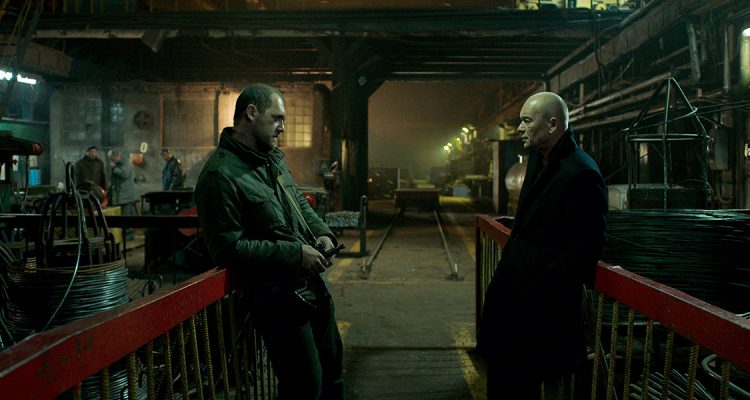Right from the first moments of “The Factory,” it’s clear that Greyhair (Denis Shvedov) has been through some shit. He chooses to walk six kilometers every morning, rain or shine, to the factory where he works, forgoing the company bus because it’s too noisy. Once there, he feeds metal rods into a machine all day long with monotonous efficiency, without saying a single word to his co-workers. His scarred over an eye, and markings all over his back, betray a haunted and violent past. It doesn’t take much to deduce that he’s a loner, who probably doesn’t particularly care for the company of other men. How he convinces a ragtag crew of his coworkers to embark on a poorly thought out heist is just one of the leaps of faith you’ll have to take to get through this dull thriller from Russian writer/director Yury Bykov.
READ MORE: Toronto International Film Festival: 22 Most Anticipated Movies
The grim lives and underpaid routine of Greyhair and his colleagues is upended one day by the arrival of factory owner Kalugin (Andrey Smolyakov). Rolling up in his Mercedes with an entourage in tow, he announces that the factory will close at the end of the month, and even worse, employees won’t receive their pay until six months later. That’s all it takes for Greyhair to propose to a small cadre of his cohorts that they kidnap the well-connected Kalugin, hold him for ransom, and get the money they’re owed and then some. Everyone has personal reasons for embarking on this delusional scheme — helpfully relayed via montage — but as one of the semi-reluctant conspirators rightfully predicts, “this won’t end well.”
READ MORE: 55 Must-See Films: The 2018 Fall Movie Preview
Nabbing Kalugin and bringing him back to the factory where Greyhair and his crew plan to hole up and make their demands from, turns out to be the easy part. Everything else is a slowly unfolding disaster. As ordered, Kalugin’s private security team, headed by Anton (Vladislav Abashin), arrive and assess what they’ll need to do to get their boss out safely. But hot on their heels are the cops who have been tipped off to the crime, despite Greyhair’s strict orders not to have them involved. There’s a rat somewhere in the mix, but this is just the first of many potentially compelling plot turns that wind up underdeveloped.
Attempting to blend “Free Fire” with “Dog Day Afternoon,” Bykov’s picture has none of the former’s spontaneity or the latter’s smarts and texture. At one point, Greyhair demands the media show up and film Kalugin’s “confession” of his crimes, and an on-camera recording is duly made. Yet, the network bizarrely decides to keep their exclusive, real-time reporting off the air until the morning. In fact, they leave the factory grounds altogether. Whatever the fallout might be, it will happen off camera. Meanwhile, try as he might move the chess piece characters around the board, Bykov quickly runs out of options, and as you might expect, that’s when guns start blazing.
Filmed with rigid competence, Bykov loses his way with action scenes that are poorly mapped out and blandly shot. Tonally, the picture never reaches the fever pitch of tension it aims for, and that’s partially the fault of composer Anna Drubich. Veering from third-rate Jóhann Jóhannsson style drones (which sound eerily like “The Beast” from “Sicario”) to straight-ahead heavy metal guitar riffing, the music keeps “The Factory” from finding any kind of footing. However, the biggest issue may be in the film’s conception altogether.
First-billed, but with only enough material to emerge as a supporting player, Abashin’s Anton offers the most interest and complexity in this otherwise simplistic genre flick. The weight of the years of being Kalugin’s foot soldier is beginning to wear on Anton, who finds some measure of sympathy for what Greyhair is fighting for. Morally, he finds himself firmly between Kalugin and Greyhair, even if his job requires him to do everything in his power to rescue his boss. “The Factory” would’ve been a far more effective and involving thriller had it been told entirely from Anton’s perspective, following a man caught between the legal corruption of his boss and the illegal desperation of workers fighting to be treated fairly.
That thematic undercurrent is still present but ultimately muddled, with Bykov never entirely completing the full handoff of the pivot shift between Greyhair and Anton. Instead, “The Factory” wobbles as a three-hander, attempting to offer equal value to the perspectives of Greyhair, Kalugin, and Anton. The result is an airless thriller that has little to say and wastes a lot of time saying it. [D]
Check out all our coverage from the 2018 Toronto International Film Festival here.

